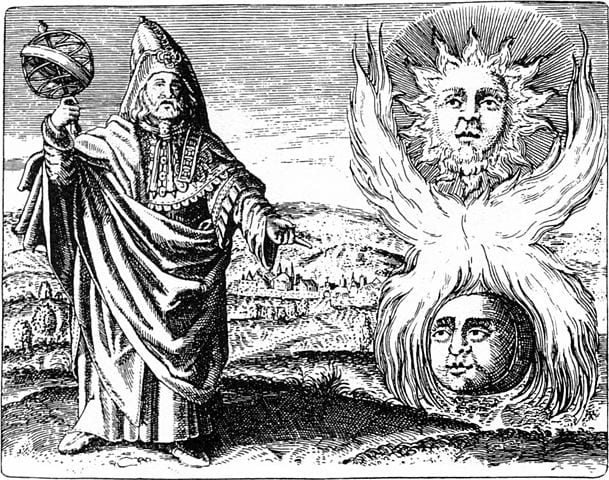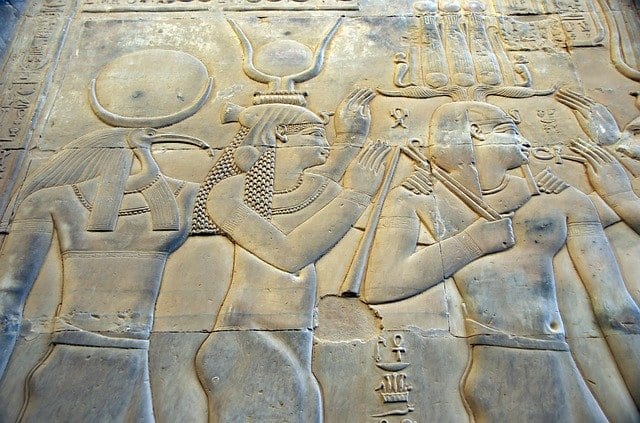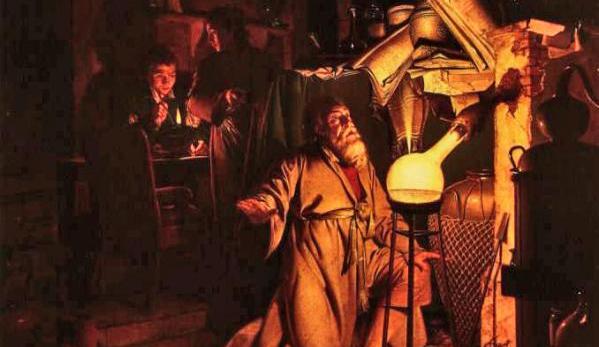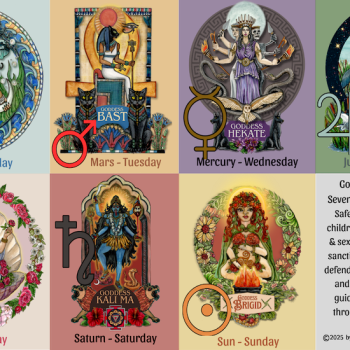Among witches, the name Hermes Trismegistus should be equally recognizable to us as the names of Jesus, Moses, Buddha, or Muhammad. In our modern texts, this name is often cited as the source of the “Hermetic Principles,” but rarely with adequate historical context, and so these origins remain significantly misunderstood.
In these Foundations of Modern Witchcraft articles, I will share what I learned on my quest to discover the answers to the following questions: Who is this fellow Hermes Trismegistus? What does Hermetic Philosophy teach? How does that cosmology include both the Goddess and the God? Where do the “Seven Hermetic Principles” actually come from? How did this Egyptian philosophy find its way into British Wicca? and why is that important to Modern Witchcraft today?

Who is this fellow Hermes Mercurius Trismegistus?
Surprise, surprise! Like many of the world’s legendary religious figures, Hermes Mercurius Trismegistus likely never physically existed.[3] This is the Greek name for the Egyptian whom legends claim was either the god Thoth himself, or merely an ancient sage who received a vision from the Ibis-headed God of knowledge, magic and writing. This name translates as “thrice-greatest Hermes.” Thrice Great was a common Egyptian epithet for Thoth at the time. Philosophers in Alexandria, being both Egyptian by heritage, and educated in Greek philosophy, conflated Thoth with the Greek God Hermes, or by his Roman name, Mercury.
Hermes Trismegistus is credited as the source of a collection of 18 texts, or tractates, which together make up a body of work known as the Corpus Hermeticum. These are the foundational teachings of a philosophy known as Hermeticism. To put this in context to the over-culture, this “book” is not unlike the ancient scriptures of the Torah, Bible, or Koran, and are of a relatively similar age.
Who this figure truly was, may never be known. What seems clear is that the writings ascribed to Hermes emerged from many individual teachers in Roman-ruled Alexandria Egypt during the first few centuries of the common era. Here, philosophers instructed in natural Greek Philosophies such as Platonism and Stoicism sought to dismiss the old dogmatic and orthodox interpretations of Greece, and seek “god” through their own philosophic religion. The short story is that Hermeticism is an example of a syncretic, second-generation pagan religion. An apt comparison is to the way that Buddhism diverges from a basis in Hindu polytheism, in the same way that Hermeticism diverges from a basis in the classical Hellenic/Egyptian polytheism. In both examples, the focus shifts to the philosophy and practices of personal improvement, rather than the worship and religiosity of a particular deity; both revere the human teacher of that Gnosis of “God”, without defaulting to a worship of that teacher.
In the introduction of his translation entitled Hermetica, Sir Walter Scott suggests that during the first three centuries CE in Alexandria, the writers of the tractates would have described Hermes Trismegistus as “…a man like you and me – a man who lived in Egypt…during the time of King Ammon. But he was a man who attained gnosis (that is to say knowledge of God, but a kind of “knowledge” that involved union with God); and he was the first and greatest teacher of gnosis. He died…and after death he became a god – just as you and I also, if we attain to gnosis, will become gods after our deaths.”[7]
In The Secret History of Hermes Trismegistus, Florian Ebeling described the many philosophical influences of Hermeticism as such:
“Both the figure and writings of Hermes Trismegistus were the product of the syncretic, Hellenistic philosophy of nature, which itself was a conglomeration of Aristotelian, Platonic, Stoic, and Pythagorean doctrines, interspersed with motifs from Egyptian mythology, and theme of Jewish and Iranian origin.”[8]
Who actually wrote the Corpus Hermeticum?
All the tractates within the Corpus Hermeticum by various writers simply chose to credit Hermes Trismegistus as the author of their own writings, to lend credibility and prestige that they would have never received under their own names. This was a common practice during that time. Scott does suggest in his introduction to Hermetica, that is was likely that the original authors did not intend to deceive, because everyone in their circle understood this common practice. However, after those writings left their inner circles, and time wore on, this truth was lost.
The individual Egyptian teachers in Alexandria taught orally to a few students at a time, who may eventually write down the gist of the talks, which would be passed around among similar groups. The tractates of the Corpus Hermeticum were written by many different pupils, studying with many different teachers of the time. So why are they all written as if from the point of view of Hermes Trismegistus? Why not use their own names? Sir Walter Scott answers this question in Hermetica:
“It is true that there was at the same time a strong tendency to syncretism; that is to say, men of different philosophic schools were very ready to borrow thoughts from one another; but that, the most part, meant little more than that a man acknowledged the authority of two or more masters instead of one, and made some attempt to blend or reconciled the teachings of those masters. The names of the great thinkers of earlier times – Plato, Pythagoras, and others – were held in almost superstitious veneration…it hardly occurred to people that anyone could possibly hit on a truth by thinking for himself.” [4]
So their adherents kept seeking earlier sources from where the Masters must have received their wisdom. To the philosophers in Egypt influenced by Greek Culture, their preferred assumption of that source was the mythological figure of Hermes Trismegistus. Scott goes on to say, “It had long been accepted as a known historical fact that both Plato and Pythagorus studied in Egypt. So they assumed they must have studied in the schools of Egyptian Priests.”[5] No one knew for sure what was taught in those mystery schools, except that they were said to have ancient texts written by the God Thoth.

Origins and Development of Hermetic Philosophy
Hermetic Philosophy began developing when Alexander the Great invaded Egypt in 332 BCE, bringing Greek culture and religion with him. He built the name-sake city of Alexandria, where the great library stood. Here the Greek philosophical schools mingled with the robust Egyptian culture and created a renowned center of learning. Here, intellectuals from all over the ancient world came together in debate.
After Rome conquered Egypt in 30 BCE, Hermetic philosophy developed in Alexandria over the first three centuries of the common era. This coincides with the introduction and development of early Christianity. At first, Roman rulers were tolerant of a pluralistic society. Unfortunately, the brutal spread of Christianity eventually led to clashes with pagans; “pagans” being the latin word used to refer to everyone still practicing their indigenous, or Non-Abrahamic religions. The intolerance of those early Christians in Alexandria resulted in terrible violence and a partial burning of the Alexandrian library.
The Roman Empire officially Christianized in 325 CE, and the rest of the Library of Alexandria was burned to the ground. Many books attributed to Hermes Trismegistus are known to have been destroyed in that fire. By then, heresy against the Christian doctrine meant a death sentence. You could convert or die, so many of the Hermetic Philosophers chose instead to migrate east into pre-Islamic Persia (modern-day Iran and Iraq) where they guardedly continued their studies.
Hermetic Alchemy Emerges
These foundational philosophies were furthered within the influences of the Arab world. Here the occult arts and sciences of Astrology, Alchemy, Qabala/Kabbalah, Tarot and Ceremonial Magick all evolved into being over the centuries. Interestingly, the word “alchemy” was formed due to the Greek word for Egypt being Khem, or Khemet, which meant “The Black Land.” This described the dark, fertile soil left by the flooding of the Nile. Knowledge of the Egyptian sciences were called Khemia, or The Black Art, by the Greeks. After the Egyptian Hermeticists migrated into Persia, the Arabic prefix Al- (the) was added in front of Khemia. In this case, the word Al-khemia came to be roughly translated as “The Black Arts of Egypt.” Later the spelling shifted to what we know now as Alchemy.[2]
There are hints that a few early Hermeticists and alchemists may have traveled into Europe prior to the fall of Rome, in 476 CE. Unfortunately, after the Dark Ages of Christianity descended in Europe, any scientific pursuits there came to an abrupt halt for several centuries. It wouldn’t be until around 800 CE that alchemy would return to western Europe with the entry of Islamic populations.
Later, thanks to the D’Medici family in 15th Century Italy, the Hermetic Texts re-emerged and were translated into Latin, making them widely available and very popular. Though, at the time, the origins of the text were largely misunderstood to have been somehow related to Moses, and thus of Hebrew origin; this turned out to be absolutely wrong. However, for a time the study of Hermetic Alchemy became more socially acceptable by Christian scholars such as Sir Isaac Newton. We’ll discuss that further history in a forthcoming article.

The Moral of the Story
By now, the person-hood of Hermes Trismegistus is largely unimportant. Unlike our literalist neighbors in the Judeo-Christian over-culture, occultist do not need the originator of our Hermetic philosophies to have been a literal, living, divinely-chosen person. Nor do we necessarily need for these notions to have been from the specific Egyptian God, Thoth. Yet, understanding how and where these notions originated is absolutely necessary to keep us from falling into the pitfalls of empty religiosity and veneration of a “man” or a “god,” rather than the relevant ideas we may pluck from their stories and put to benefit in our modern lives.
A primary teaching of Hermetics is that we are all incarnations of the Divine Mind, and therefore have a divine nature; we only need to remember our divinity, and apply reason, so that we may grow in wisdom and evolve in our power. If this is true, then every person along the chain that developed Hermetics… everyone who contemplated, challenged, tested, and wrote down their insights to be shared with others… from the mists of pre-historic guesses that the ancients conveniently named “Hermes Trismegistus,” to the robustly codified philosophies that continue to be useful today… each voice made a divine contribution.
It doesn’t really matter which nation these mages came from, which gods they venerated, or what they called their personal religion. What does matter is that they’ve hailed from all over classical civilization, and syncretized their cultural contributions, and therefore this heritage may be enjoyed by everyone. Hermetics informs our collective magickal culture.
The Is-ness of the Divine Cosmos wants to be understood; it burbles up through the dreams and intuitions of evolved minds everywhere. Labels and “religion” matter not. Witches can proudly continue those contributions within our own Great Work of Magick, and with our own preferred metaphors, tools and rituals. We can further refine the application of this philosophy into a healthy magickal and spiritual practice for our modern world.
Continue reading the next article in this series exploring Hermetic Philosophy, the history of how they found their way from ancient Egypt into modern occultism, and the relevance to Modern Witchcraft practices today!
References for this Series:
[1] The Kybalion 100th Anniversary Ed. Introduced and Edited by Philip Deslippe
[2] Barlett, Robert Allen. Real Alchemy. Page 12-13
[3] Ebeling, Florian. The Secret History of Hermes Trismegistus: Hermeticism from Ancient to Modern Times. Ithaca and London, Cornell University Press, 2007. Page 3.
[4] Scott, Sir Walter. Hermetica: The ancient Greek and Latin Writings Which Contain Religious or Philosophic Teachings ascribed to Hermes Trismegistus, Edited with English Translation and Notes. Boston: Shambala Press, 1993. page 3
[5] Scott, Sir Walter. Hermetica. page 4
[6] Hall, Manly P. The Secret Teachings of all Ages. XXXVII-XL
[7] Scott, Sir Walter. Hermetica. Page 6.
[8] Ebeling, Florian. The Secret History of Hermes Trismegistus. Page 9
[9] This is also how we came to have the First Harry Potter novel, thank you JK Rowling for having studied the classics.
[10] Hall, Manly P. The Secret Teachings of All Ages, XXXVII-XL
[11] Corpus Hermeticum Book 13:8.
[12] Corpus Hermeticum Book 13:7


















